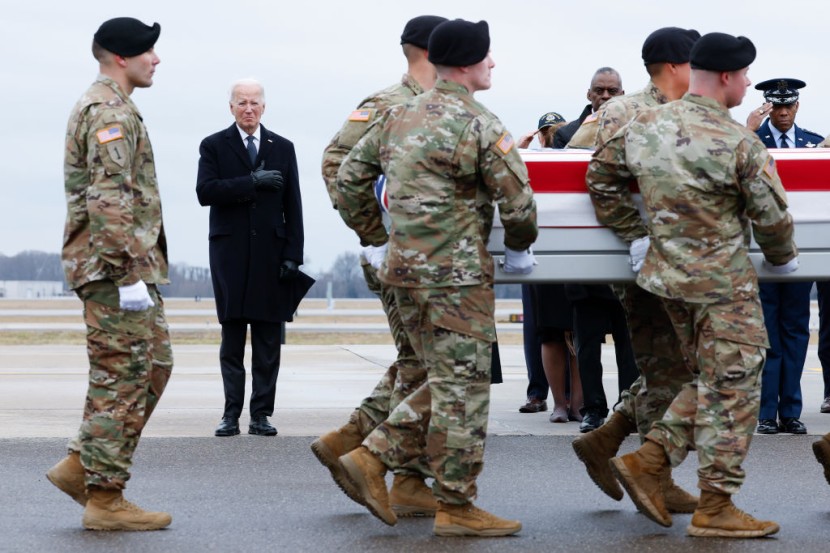U.S. Defense Secretary Lloyd Austin aimed to encourage American troops on the military's ability to face attacks by Iran-backed militants shortly before a deadly drone strike killed three U.S. soldiers in Jordan.

Austin, in previously unpublished remarks to sailors aboard the Gerald R. Ford aircraft carrier on December 20, said the number one reason the militants had failed to that point was that "they're not very good at what they do."
"Every day, Iranian proxies are shooting at our troops that are in Iraq and Syria. They haven't been effective at all because (of) two reasons: Number one, they're not very good at what they do," Austin told the crew.
"But number two, we've done a lot of things to ensure that we have the adequate force protection ... Eventually, as we all know, they may get lucky one day and cause injury to one of our troops. But we will stay on the balls of our feet and make sure that that doesn't happen."
In the aftermath of the drone strike, President Joe Biden is vowing to do what it takes to protect U.S. troops from a mounting spiral of violence in the Middle East, where Iran-aligned militants are firing at them in Iraq, Syria, Jordan, and off the coast of Yemen in the Red Sea.
However, current and former U.S. officials told Reuters the militants' periodic success in attacks may be unavoidable, given the sheer number of drones, rockets, and missiles fired at U.S. troops and the fact that base defenses cannot realistically be completely effective 100% of the time.
The Experts Are Weighing In
Experts also caution against underestimating the militants despite the failure of most of their attacks.
Charles Lister of the Washington-based Middle East Institute recalled former President Barack Obama's description of Islamic State as a junior varsity team in 2014 even as the group was gathering strength.
"To suggest, Obama-style, that 'well, they're just a J.V. team,' and we can chuckle along and take the hits and know that nothing serious is happening is just profoundly naive," Lister said. "These groups have conducted sophisticated transnational strikes, and they have a very deadly history against American troops."
Still, U.S. commanders have a long history of putting on a brave face before their troops. Austin is a retired four-star general who served on the ground in Iraq and has found himself under fire recently.
According to Reuters, as of February 7, there have been more than 168 attacks against U.S. troops in Iraq, Syria, and Jordan since Middle East tensions surged in October when Israel declared war on Gaza.
The worst attack occurred on January 28, when a drone struck a U.S. base known as Tower 22 on Jordan's border with Syria, killing Sergeant William Jerome Rivers, Specialist Kennedy Ladon Sanders, and Specialist Breonna Alexsondria Moffett.
One senior U.S. military official, speaking with Reuters on the condition of anonymity, called that attack "tragic, unlucky - but predictable."
"Because that's the nature of combat. It's not an antiseptic environment where you can attain perfection" in defending yourself, the former official said.
While a U.S. military investigation continues, U.S. officials have told Reuters several factors may have contributed to the failure of American defenses at the remote base in Jordan.
The most noteworthy mention, was the low altitude the drone was flying as it approached Tower 22.
The Biden Administration has received criticism over their "lackluster" response to January 28. Republicans have pushed for U.S. strikes on Iranian forces, including on Iranian soil. However, the president has resisted over his concerns of coaxing Iran into a larger war.
"Iran can stop these attacks if they want to," the former U.S. military official said.
Adding, "Why should they? They're not being hurt by our response."









